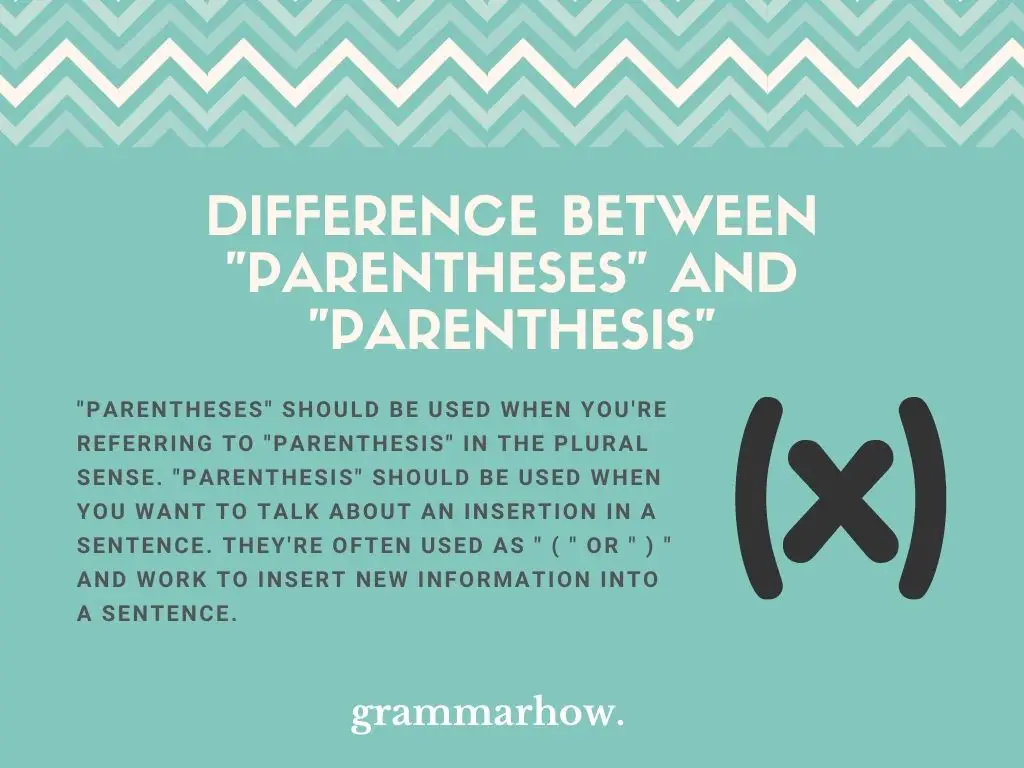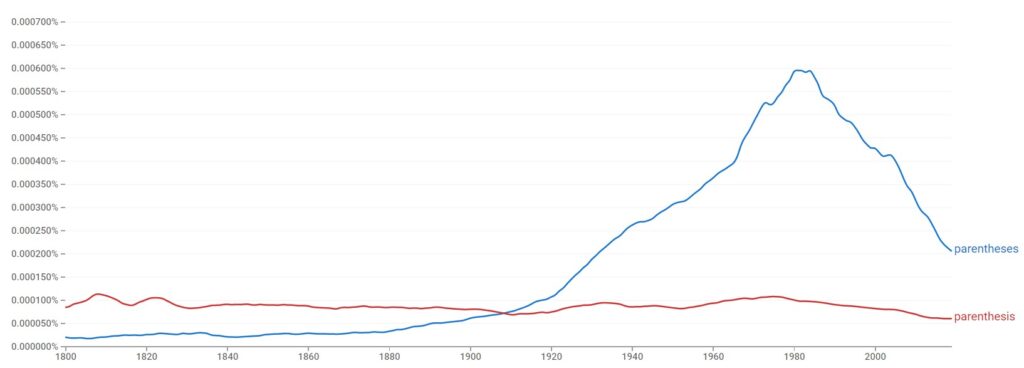The difference between parentheses and parenthesis is a straightforward one. It’s important to learn the differences, though, to cover what they are in this article. We’ll also look at how to use them properly, so you don’t worry about making mistakes in the future.
What Is The Difference Between “Parentheses” And “Parenthesis”?
“Parentheses” should be used when you’re referring to “parenthesis” in the plural sense. “Parenthesis” should be used when you want to talk about an insertion in a sentence. They’re often used as ” ( ” or ” ) ” and work to insert new information into a sentence.

According to The Cambridge Dictionary, the definition of “parenthesis” is “a remark that is added to a sentence, often to provide an explanation or extra information, that is separated from the main part of the sentence by commas, brackets, or dashes.”
Is “Parentheses” Or “Parenthesis” Used The Most?
So, which of the two words sees more usage in English. It’s common to find that the more popular word is most likely the one you’ll want to spend more time learning (since more native speakers will be familiar with it).
According to this graph, “parentheses” is the most popular word of the two. That’s because when you’re talking about them, you’re talking about opening and closing a new clause, meaning they always come in pairs and therefore need to be referred to in the plural form.

While “parenthesis” does occasionally get used, the situations where it works best are often overlooked. You’ll need to refer to them as a singular concept in this case, which is usually wrong.
Look at the following example:
- Here we see a thing (which can’t be described) about to do something interested.
This is how parentheses are used in a sentence. As you can see, we open with “(” and close with “).” We always need the two present to make it work, which is why we always use it in the plural form.
What Is The Plural Of “Parenthesis”?
As we’ve mentioned already, the plural of “parenthesis” is “parentheses.” When you’re referring to more than one (which is usually how you’ll use them), you’ll need to use “parentheses.”
It’s rare to use “parenthesis” correctly. You’ll often find yourself talking about more than one, which is why we use the plural form (which is “parenthesis”).
Incidentally, “parentheses” don’t always have to refer to two brackets as you might expect. They can also refer to dashes or commas. In these cases, you might not need a second dash or comma to close the parenthetical statement.
- We can talk about this all day – which I’m sure you’ll agree sounds fun.
This is a way to use parenthesis as a singular. However, when we refer to it as a dash in this sense, we usually call it a “dash” or simply refer to it as “parentheses.” That’s why it’s rare to hear it in the singular form, even when we see it written as such.
What Are Parentheses Used For?
Parentheses are used as extensions and insertions to a clause. They come from the Greek word meaning “insertion.” We can use them to include further information related to the clause, though they can also be removed and have the sentence still make sense.
You can look at using parentheses as including a parenthetical element in a sentence structure. Let’s demonstrate what we mean:
- The bushes (which we noticed need trimming) are being used as trash cans.
- The bushes are being used as trash cans.
As you can see, the first example uses the parenthetical clause “which we noticed need trimming.” While it adds extra information to the sentence, it isn’t a necessary feature.
The second example also makes sense, and we’ve simply removed the parentheses and the clause within them to show this.
Are Parentheses Grammatically Correct To Use?
It is grammatically correct to use parentheses when they’re used correctly.
If you’re not deliberately choosing to add further information to a sentence already, then you might find that you’re using parentheses incorrectly.
For example:
- Correct:His father (who needs medical assistance) called me today.
- Incorrect:(His father) who needs medical assistance called me today.
While the example is somewhat extreme, it’s important to notice where you include the parentheses. If you get it wrong, then it will be grammatically incorrect.
Can You Put Parentheses Inside Parentheses?
Generally, you should not put parentheses inside parentheses. If you do, it leads the clause created within the parentheses to get convoluted and confusing for the readers and most people will stop paying attention.
If you feel the need to include parentheses inside parentheses, it’s most likely because you’ve used them incorrectly. You’ll want to revisit the clause you’re writing to see whether you’re adding too much information to it.
The whole point to parentheses is to keep your information short and to the point.
When Should The Use Of Parentheses Be Avoided?
If you’re writing about something that doesn’t need further (and often unnecessary) information or clarification, then parentheses should be avoided.
You’ll notice with some practice that there’s a specific time and place where parentheses work best. If you want to get straight to the point, you should avoid using them because they’ll clog up your writing and provide unnecessary information to the reader.
Is Using A Parenthesis Informal And Unprofessional?
Most people use parentheses in formal writing and documentation. It’s common to include them in essays for things like citations or referencing quotes that provide further information.
Since it’s common practice to use parentheses in this way, they are therefore considered professional and formal. You can also use them in informal situations too. There is no limit to where you can use parentheses.
Do Parentheses Mean To Multiply?
There is a slightly different meaning for parentheses when applied to mathematics.
Parentheses in a sum or equation are used to multiply two clauses together in that equation. It’s mostly used in algebraic equations.
- x(x-2) = y
This means that “x” is multiplied by “x-2” to equal “y.” This is the only case where parentheses mean to multiply something.

Martin holds a Master’s degree in Finance and International Business. He has six years of experience in professional communication with clients, executives, and colleagues. Furthermore, he has teaching experience from Aarhus University. Martin has been featured as an expert in communication and teaching on Forbes and Shopify. Read more about Martin here.
